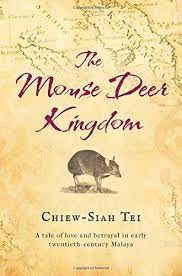Exile and Immigration: The Mouse Deer Kingdom by Chiew-Siah Tei
Originally published in Gutter 10 (Spring 2014)
Chiew-Siah Tei’s first novel, Little Hut of Leaping Fishes, followed the rise of Chai Mingzhi from small boy to learned Mandarin during the later Qing period (late 19th Century). The book climaxes when the Boxer Rebellion forces Chai, his sister, his niece and the Englishman Martin Gray, to flee China for the land yet to become Malaysia. The Mouse Deer Kingdom continues Chai’s story, but is less a sequel than a stand alone novel featuring many of the same characters. Tei manages to bring in new readers while avoiding a ‘previously on …’ moment, so unfamiliarity with Little Hut is no handicap.
The focus of the narrative is now Engi, an indigenous boy taken in by Chai. Arriving together, it is inevitable the group will dissolve through death, departure and betrayal. Pivoting on Engi, the narration flows around other key characters, allowing the reader access to the intricate weave of secrets and lies as it begins to fray. In turn each bond of loyalty is broken leaving Chai, with Engi watching from the wings, alone. This narrative arc has an inbuilt frustration for the reader. As characters break from their orbit around Chai they disappear, leaving a number of loose ends and untold stories. The fates of Martin, and Chai’s niece, Jiaxi, in particular are unsatisfactorily concluded. Tei is at her best when describing Malaysia. Gentle, poetic descriptions of the wild landscape and deft, almost Dickensian pen-portraits of the hardships faced by both displaced natives and disillusioned incomers are shot through with an obvious deep love for her home country. Malaysia, like many countries in the area, has a long and complicated relationship with migration and colonisation, being at one time or another under the control of the Portuguese, Dutch, English and Japanese and having an ethnically diverse population. As such it is an ideal setting for an exploration of divisions and unity.
At heart it is a novel about exile and immigration, and Tei is excellent on the racial and cultural tensions between natives and incomers and between different immigrant groups. The centring of Engi by a simple switch from third to first person sets up a dynamic dialectic. Initially he is the voice of the forest-dwelling natives whose lives and culture are systematically destroyed by encroaching rubber plantations and the kidnapping of women to become ‘wives’. The all-too-human hopes and fears of the immigrants, educated and not, young and old, Chinese and English, compete for supremacy. This structural and narrative arrangement works to highlight the social and historical forces pulling in diverse directions; the battlefield of indigenous and immigrant populations to this day. As an exploration of these themes, The Mouse Deer Kingdom is both sympathetic and honest.
While the majority of historical fiction focuses on one particular event or one particular figure at the heart of events, Tei does something much more interesting. She shows, through the journeys of her characters, the already interconnected nature of the world more than a century ago, and how the movement of people to, from, and around the Far East has both driven and hindered social cohesion. Globalisation is nothing new. In an era when immigration is never out of the news and a discussion about the multicultural values of Britain is ongoing, Tei’s book is a timely reminder of both the problems and undoubted benefits the continual movement of people brings. It is infused with the message that more empathy is needed, as is an understanding that finding somewhere safe and secure to call home is one of the most basic human instincts.



